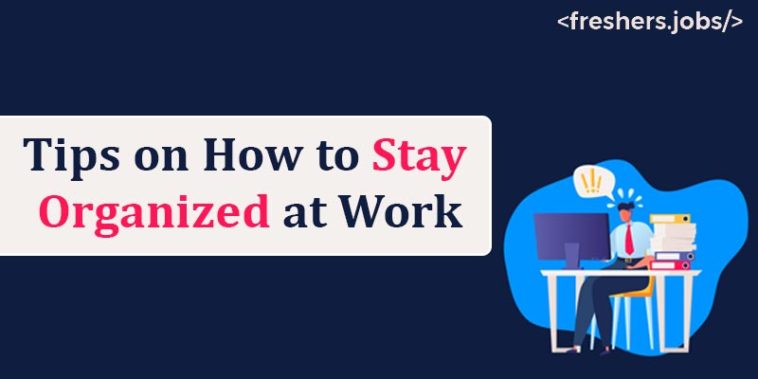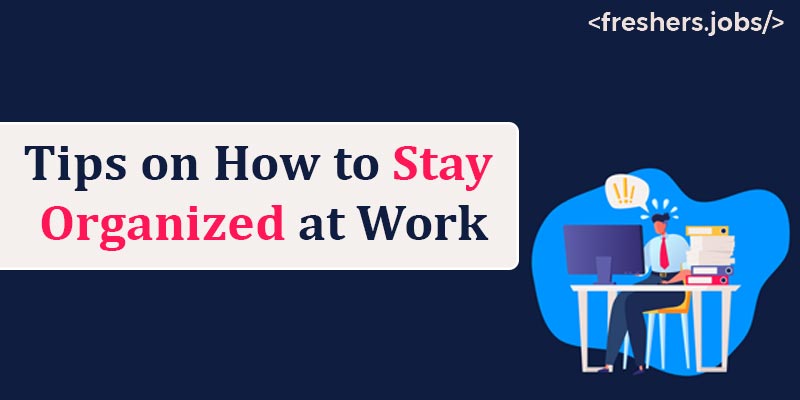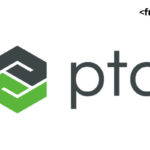Professionals in a variety of roles and sectors can gain from learning how to be organised. You can achieve your goals, maintain a work-life balance, lower your stress levels, and increase your concentration by being organised. You can choose the most effective strategies and tactics for your company by being aware of the different approaches you can take.
Consider your position in an organisation if you are trying to increase your focus and productivity at work. While most people know the need to keep their physical workplace orderly, organisation occurs on many levels. You can determine the changes you need to make by reviewing organizing strategies for every aspect of your life, from your routine to your brain.
In this blog, we will review the benefits of having an organisation at work and give you tips on how to do it.
Why is Staying Organized Important?
Staying organised is crucial in any workplace environment, regardless of the industry. It is a necessary skill that can help you stay focused, prioritise tasks, meet deadlines, and increase productivity. Studies have shown that disorganisation can negatively affect employee morale, efficiency, and the overall success of a business.
First and foremost, being organised helps you manage your time effectively. You can accomplish tasks more efficiently and promptly with clear priorities and a well-planned schedule. This can help reduce stress and anxiety associated with missed deadlines, work overload, and conflicting priorities.
Secondly, staying organized for your freshers jobs can help you maintain a positive work-life balance. Organizing work and prioritizing tasks can free up time for other activities, such as spending time with family and friends, pursuing hobbies or interests, and engaging in physical exercise. This can help reduce burnout, a common problem in today’s fast-paced work environment.
Furthermore, being organized can help you avoid mistakes and errors that can be costly for a business. When you know where to find the information you need, you can ensure that you are making informed decisions based on accurate data. This can help you avoid costly mistakes and improve the quality of your work.
Staying organized also helps you communicate effectively with your colleagues and clients. When you are well-organized at work, you can easily share information and collaborate on projects, which can help you build stronger relationships and foster a positive work environment.
For a well-organized work environment, freshers can look for jobs at Oracle jobs for freshers where you have an organized work culture.
How to Stay Organized at Work
Have Enough Rest
How well-organized and effective you are at work greatly depends on how much sleep you get. To help you re-energize yourself, aim to get almost seven hours of sleep each night. You should also take quick rests during the day.
Focus Single Job at a Time
While multitasking is frequently praised, the truth is that switching between tasks impairs our judgement and makes it harder for us to finish any work at hand. Additionally, How can we stay organised? Attempting to multitask can make you more stressed out and affect your ability to concentrate. Focus on one job at a time, finishing it or putting it aside completely when ready to work on another.
Set Job Priorities
Start with your top priorities because you probably have a long list of tasks you need to get done during the day. It’s vital to begin politely and firmly declining requests for other items. Organizing your day and thoughts becomes more straightforward when you start prioritizing tasks that help you achieve your goal at the top of your list.
Take Breaks
How to be organized at work? To remain motivated and focused on what needs to be done, take breaks at least every 90 minutes. Get up from your desk, stroll, or drink coffee during your break. If you’re working on a bigger job, breaks are incredibly crucial.
Establish Limits for Leisure Time
While upholding positive working relationships is crucial, it’s also essential to set limits, so networking doesn’t negatively affect your output. Set boundaries and politely let the other team members know what you anticipate of them.
Reduce Congestion
Clear everything off your desk to start, then arrange items according to what you need to have on it, what can be thrown away, and what needs to be filed or placed in a drawer. Any paper that can be repurposed or destroyed should be thrown away. Make sure to shred anything that includes sensitive information for security reasons to be organised at work.
Establish a Filing Strategy
Make a filing system for the documents you want to retain. Sort your documents into categories and give each divider or folder a title, so you know what’s inside. Doing this makes it simple to file paperwork in the appropriate spot each time and locate any items you need quickly. After that, use the one-touch technique. Anytime a paper appears on your desk, file it immediately or discard it. Additionally, whenever a job is finished, go over all the related paperwork and throw away anything that is no longer required.
For more job openings, you can look for jobs from freshers jobs in Hyderabad to land your dream job.
Clear your Email
How to stay organised? Several times a year, go through all your communications and completely delete them. Spend some time removing your subscriptions to newsletters, or use a tool that enables mass removal. Consider configuring a filter to route specific emails to specific files automatically. You will feel more organised and focused whenever you access your email after clearing out your inbox.
Automate Routine Work
Many people regularly complete time-consuming tasks, particularly when considering how frequently they complete them over a month or year. Search for methods to automate those chores. Consider installing a visitor management system, for example, if visitors frequently drop by your workplace to sign in electronically. If you often make meetings with people, whether team members or customers, try setting up a scheduling system that syncs with your calendar automatically to save time on scheduling.
Utilize a Notebook
How to be organized? Always carry a notebook and pen to quickly jot down ideas or reminders when they come to you. If you keep them all in one location, it will be simpler for you to look back at your notes, ideas, and thoughts. Since you can more easily flip through the pages to locate what you are looking for, this method is much better than using sticky notes to keep track of ideas. You could also use the electronic notes on your phone if that’s what you prefer.
Make use of your Schedule
Keep track of project dates, meetings, and appointments using your work calendar. If you are a contractor working on several tasks simultaneously, calendars are especially crucial for organising work.
Connect your Phone
You should take your phone around with you frequently. When you are away from your workplace, use your phone to help you stay organised. Turn on calendar notifications on your phone to receive alerts or jobs alerts when a meeting comes and sync it with your work email and calendar. Reviewing various applications that can keep you organised is something you should do.
Do not Multitask
Focus on finishing one project or task at the moment rather than multitasking. This will help you make deadlines, reduce stress at work, and avoid mistakes. You might feel more accomplished when you work uninterrupted on a single task. Once you finish it, you can cross it off your list of things to do and use the energy to begin your next project for the day.
Conclusion
To summarise, How to be organised and stay organised at work is essential for maximising productivity, minimising stress, and achieving success. You can track your workflow and focus on the most important tasks by implementing strategies such as keeping a to-do list, creating a schedule, decluttering your workspace, and minimising distractions. Additionally, it’s important to regularly reassess and adjust your organisational strategies to ensure that they continue to work for you as your workload and responsibilities evolve. By prioritising organisation, you can set yourself up for success and achieve your career goals with higher salaries.




